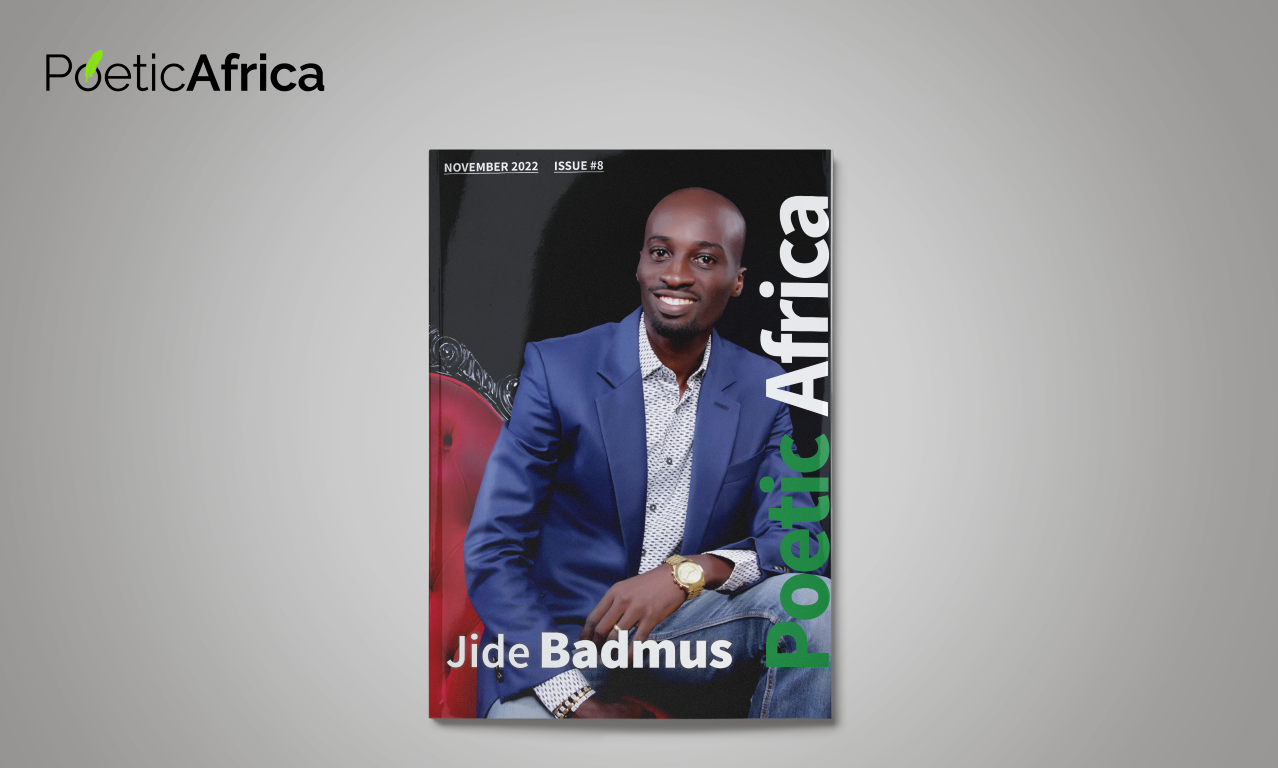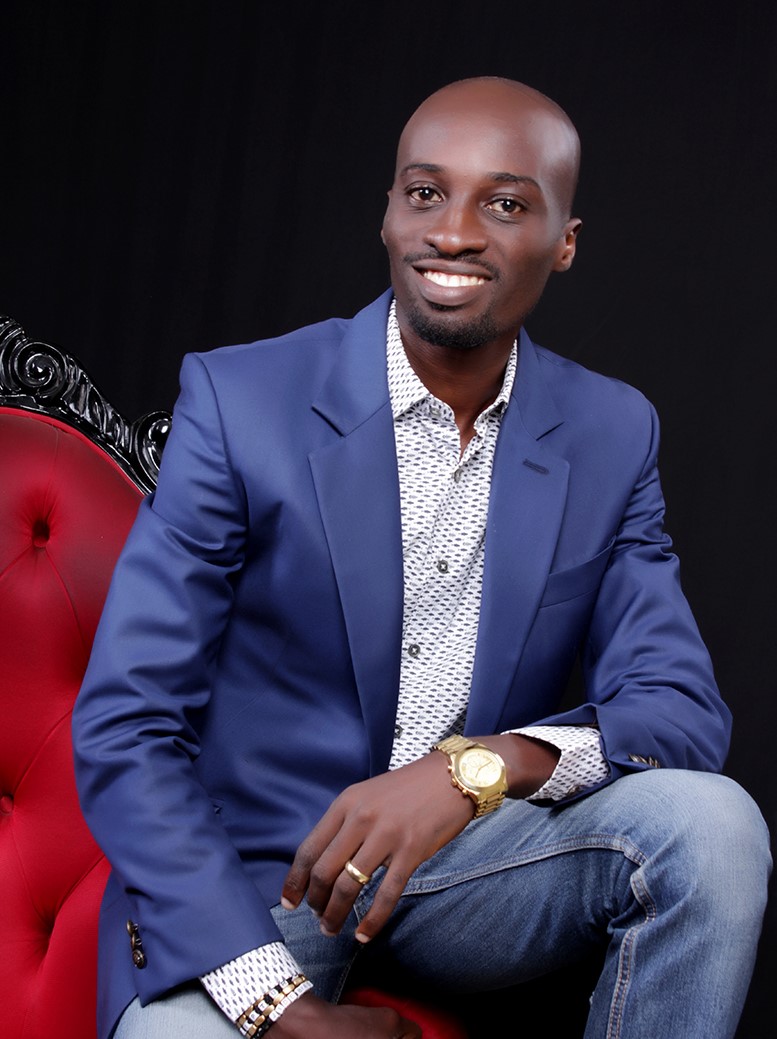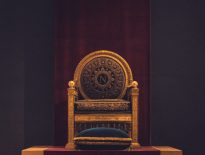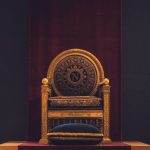Get an inside look at Jide Badmus’ story with an exclusive interview conducted by Elizabeth Akunyili (Nigeria) and Sandra Nadege (Kenya) and expertly edited by Nnane Ntube (Cameroon)

We know you are a master of brevity. So, in 3 sentences, who is Jide Badmus?
Jide Badmus: Jide Badmus is a husband and a father of two daughters. He is an engineer and a poet, the author of four books and several chapbooks. He writes about hope and healing.
All the love in one life (laughter).
Tell me about your dream when you first started writing, and how much it has changed.
Jide Badmus: This might sound strange, but my main dream when I started writing was to make poetry accessible to the average man on the street. To entertain and captivate an audience with a genre that has always been believed to be elitist.
However, like every ambitious man, in all endeavors, the dream is to excel in art and reach the pinnacle; for writing to open doors to a world of happiness, healing, and hope.
How close are you to making poetry accessible to the average person on the street, and how can we join you on this course?
Jide Badmus: I would say I’m satisfied. I have heard a couple of testimonies that confirm to me that I’m on the right track. I’ve had feedback from people who picked up my books and were surprised they could comprehend and enjoy the poetry.
As long as I keep the language simple and beautiful, the metaphors sensually relatable, and the poems brief, the layman will have something to enjoy.
People are either inspired by beauty or destruction, but you’ve interestingly found a balance, which is quite fascinating. Was there any particular incident that connected the two concepts for you?
Jide Badmus: I can’t remember an exceptional experience that could have moved me in this direction of thought. However, I think the first time I made that statement publicly was in an NTA interview after my first book, There Is A Storm In My Head, was released.
I realized that beauty is too narrow a field for inspiration. As an engineer, I can testify to the transformation on a project site (from inception to commission). When I compare pictures, especially renovations, I see the beauty that comes from ruin.
When I see ruins, I often challenge my mind to imagine what beauty might have existed in their place, as well as the possibility of renovation or restoration.
Soma Mazungumzo na Christina Lwendo
Explain the relationship between your favorite sensuality and healing anthology themes and your literary inspiration for beauty and destruction.
Jide Badmus: It is usually hard for me to pick favorites from my own works. There is remarkable growth with each new book. For the sake of your question, I will pick my latest poetry book, What Do I Call My Love for Your Body?
This collection of poems explored a lover’s body as language, war, nature, and music. War and nature are not strangers to destruction, so how, you might wonder, can I relate these to the concept of love? Music and language, on the other hand, are famous therapists and agents of healing.
In likening sex to war, imagine how we are quick to discard clothing, how in the heat of passion, love appears as though it is a battle. And how we pledge deeper allegiance and commitment to ecstasy in the aftermath, in the ruins of bodily fluids and the ashes of moans.
I think everything around us is wrapped in the concept of beauty and destruction; for every existence, healing is a constant craving.

What biases do people have towards you as a sensual poet?
Jide Badmus: Many see the erotic in literary art as mundane, perhaps not worthy of discourse. Some come from the religious angle, and some from the cultural perspective; in both cases, sex is sacred and not meant for public display.
The fact that this sub-genre is controversial is enough of a catalyst for me to keep exploring its beauty and the wealth of novelty that abounds. Like I usually say, lust is beautiful; love will struggle without a vital element of lust.
So it’s safe for me to say you like a little controversy. How is that working out for your audience and publishers?
Jide Badmus: Yes, I love controversy, as long as it is not a scandal. Controversy keeps you visible; it keeps you in the conversation.
What challenges or benefits does your work as an electrical engineer pose to your writing process?
Jide Badmus: The engineering job takes me around the country. Travel is a different form of education and a vast source of inspiration.
I do a lot of reading and writing while waiting for the bus or at the airport; I also get into deep thoughts in transit, during flights, and on long-distance bus trips. I find myself writing for weeks after a journey has ended.
I read in an interview that it took you 9 years to physically hold your debut collection—there is a storm in my head. What happened? Did you experience writer’s block? Were you perfecting it? Was there a publishing problem—9 years is a long time!
Jide Badmus: Publishing is a journey. It isn’t the first thought on your mind in the early years of your writing. It shouldn’t.
Growth is paramount, and every new writer wants to know how much they have improved. I devoted my early years to mastering art. The next phase was to mold an identity and create a niche for myself.
It took a couple of years after my first manuscript was ready to find the right publisher; the manuscript had undergone a series of changes (titles, content, form) during this period.
So, it’s not a whole 9 years, as you call it. It is a journey, one that can’t be rushed.
That is one long journey nonetheless (laughter). How has writing influenced your personal life and day-to-day interactions?
Jide Badmus: Most of the time, this isn’t something you can pin down. People around me become my muse. You are constantly in my poems and stories as a friend, relative, colleague, or neighbor.
Poetry is also a sanctuary. We seek healing in our own poems too.
Lisez – Une conversation avec Eloga Arsène
Your collection titles are always poems; there is a storm in my head; scripture; paper planes in the rain; a paradox of little fires; coffee; vowels under duress; and all the collaborative works you’ve created over the years. How do you come up with such engaging titles?
Jide Badmus: I tell young poets that naming a poem or a book is as important as the poem itself, if not more important. A title, like a name, is the first point of contact you have with the poem, just as it is with a person; it is the first element that forms the readers’ bias.
A good title lures the readers in to take a peek. Good content traps them in the book.
You are certainly a master at luring us in. Do you have a favorite among your published anthologies?
Jide Badmus: It changes with each new experience and each new book.
You have several published works, from magazines to eBooks to hardbacks. Have you ever suffered from writer’s block or found a life hack?
I don’t believe in writer’s block.
I believe writing is a process that does not start or end with writing. The observation and musing stage is where you gather and develop thoughts and form concepts and ideas. After writing, there is also that stage where you share and call for engagement.
Basically, there are three phases: cultivation, planting, and harvest.
Writing is a cycle. You read, study, write, edit, share, revise, and share. You could be in any of the phases mentioned above.

Ka-ching! That is an eye-opening analogy. Writers, no more writer’s block, just a season in the cycle. Since writing is so easy for you, what do you find most challenging in the process of publishing a poetry anthology?
Jide Badmus: Marketing and logistics. Getting the final product to the readers in Nigeria is a hectic task, hectic and costly.
I can absolutely relate to this stress. The distribution process from publishers to readers literally hikes the cost of valuable books, and it becomes discouraging to the average buyer. Have you been able to find a way around this challenge?
Jide Badmus: Not yet, though. The major issue is that my publishers are in the UK and the US. So, I need to approach book stores here in Nigeria myself.
Have you been to any popular bookstores in Lagos here? Poetry books have the least visibility; they just stack them in one corner. So, you practically have to go armed with a title to get what you want.
What are your top 3 tips for curating any anthology at inkspired? Feel free to shed more light on your inkspired platform and how we can submit our poetry as well.
Jide Badmus: INKspired has concentrated on publishing free chapbooks for selected poets in the past two years. We had five poets last year. We already have 2 chapbooks published this year; about 5 more are in the works, including Tares Oburumu, winner of the 2022 Sillerman Prize for African Poets.
To have your chapbook published, all you need to do is send it to inkspiredng@gmail.com (We have, however, reached the limit for free publishing this year.)
The primary requirement is to write great poetry. We mainly look for fresh, young voices.
We issue calls for submissions for our anthologies and select works that best fit the theme and quality that we seek.
Awesome!!! You’ll receive our submissions next. Has writing given you a family? If so, what are the benefits of this literary family?
Jide Badmus: Definitely. 90% of the people I interact with constantly are from relationships made in the literary world. I get calls from younger poets who seek relationship or career advice. People find opportunities and send them my way; I do the same. I have a special friendship with both of my Nigerian publishers beyond literature.
On two occasions at my former place of work, new staff would hear my colleagues call my name or see my email (because I was majorly working outstation) and would be surprised that the poet they’d been stanning from afar would become a senior colleague; one was an OAU student on IT placement.
So, yes, the literary world has given me a huge family.
Awwwwwwn!!! This is so amazing. What advice will you give writers trying to ascertain their unique voice and style?
Jide Badmus: They study, read, write, and edit. Repeat. Most new poets don’t take the study part as seriously as they should; they just jump into writing. Yes, I understand the passion when you have just discovered a new magic power; you just want to flex that ability. The study is actually essential; the art needs to be understood. You need to be conversant with the language. You need to know the mechanics of the craft to be able to fit in perfectly.
Many may not agree with me on this, but I always say it: avoid imitation. Yes, try out new styles, but don’t try to write like your favorite poet. I believe there’s a big difference between influence and imitation.
The key to developing a unique voice and style is introspection; how much of yourself do you really know? What themes are you comfortable with? Who is your target audience?
Consistency is also vital. You must be deliberate about growth.
Read – A Chat with Benny Wanjohi
What are your tips for African authors and editors to leverage their skills and be recognized internationally?
Jide Badmus: Keep growing the craft. Stay visible and leave digital footprints. Network.
How were you able to secure international publishers for your last two publications?
Jide Badmus: I did consistent searches on the internet, leveraged literary Twitter, and sent my manuscripts to as many publishers and calls for submission as possible. Two came back with positive responses.
Give us an insider’s gist. Are there any new collections in the pipeline? We want to be the first to know.
Jide Badmus: Once a new book is out, a couple more are in the pipeline.
There are two completed manuscripts: Black Moon on My Tongue and Dawn is an Open Wound. I am seeking publishers for them. I also have a chapbook manuscript, INSATIABLE (this might grow into an entire collection).
I am also working on two manuscripts; the titles keep changing. They are currently in the conceptual stage. I will start curating, editing, and writing more poems to fit the thematic plot.
Whoosh! I love these titles already, and I’m pumped! I’m sure everyone is already curious about places where we can buy your books within and outside Africa, and where can we find your work online?
Jide Badmus: Basically, you can find my books on Amazon. You can also get to download free chapbooks on my website https://jidebadmus.com/download.html
Find the links to my two latest books:
https://tinyurl.com/5hzr9k9b
https://tinyurl.com/nskwep3x
This Magazine is published by a team of professionals and downloadable for free. If you would like to support our work, please buy us coffee – https://www.buymeacoffee.com/wsamagazine







